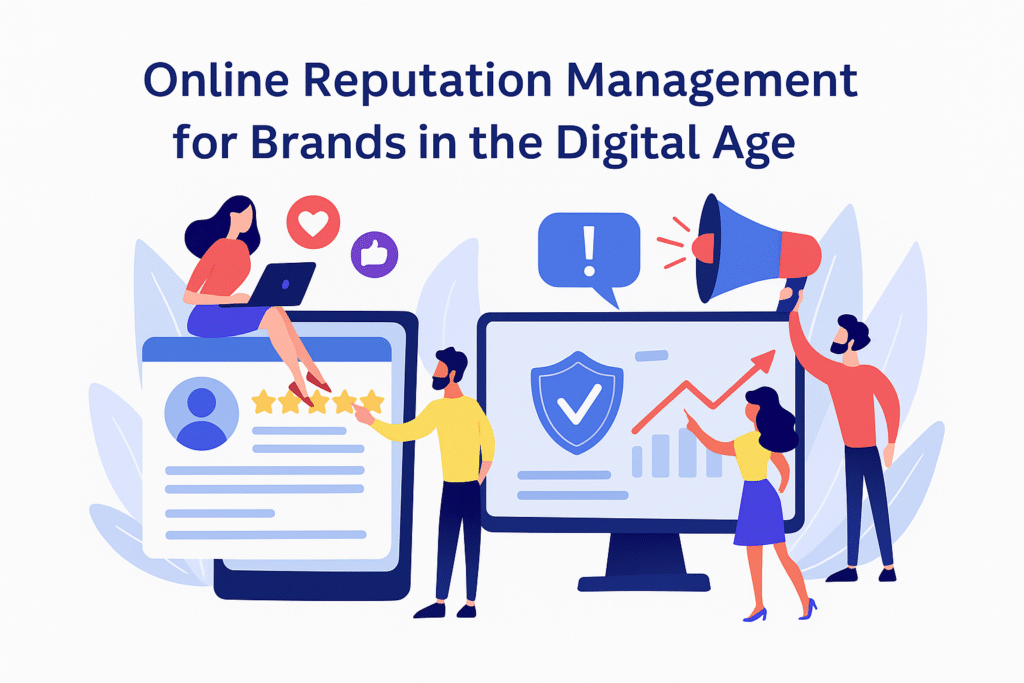In today’s hyper-connected digital world, a brand’s reputation is more than just a perception—it’s an asset that directly impacts trust, customer loyalty, and revenue. With consumers actively researching online before making decisions, even a single negative review or social media backlash can affect business credibility.
This is where Online Reputation Management (ORM) comes in. ORM is the practice of monitoring, managing, and improving how your brand is perceived online. It’s about creating proactive strategies to safeguard your image while also managing crises when they arise.
In this blog, we’ll explore why ORM matters, how to handle negative reviews, the role of proactive storytelling, and the tools brands can use to manage their reputation effectively.
Why Online Reputation Management Matters
- First Impressions are Digital
Consumers search online before engaging with a brand. Reviews, social mentions, and news articles shape their perception before you even interact with them. - Trust is Currency
Positive reputations build trust. Negative publicity erodes it, making it harder to attract customers or even talent. - Revenue Impact
Studies show that businesses with better online ratings can generate up to 20% more revenue than competitors with weaker reputations. - Competitive Advantage
An actively managed reputation helps brands stand out in saturated markets.
Handling Negative Reviews the Right Way
Every brand receives negative feedback at some point. What matters is how you respond.
- Respond Promptly and Politely: Acknowledge the issue without being defensive.
- Show Empathy: Customers want to feel heard. A sincere response goes a long way.
- Take it Offline: Offer to resolve the matter privately, but ensure others see your willingness to help.
- Learn from Feedback: Use criticism as an opportunity to improve products, services, or processes.
Example:
If a restaurant gets a bad review about slow service, a quick apology and promise to improve—not just for that customer but for all future ones—can turn a critic into a loyal customer.
Reputation Recovery Plans
Sometimes brands face larger crises—such as product recalls, negative press, or viral controversies. A structured recovery plan is critical:
- Assess the Damage: Monitor all platforms to understand the scale of the issue.
- Create a Unified Response: Ensure consistent messaging across PR, social media, and customer service.
- Address the Problem Honestly: Transparency builds credibility.
- Show Action: Communicate steps taken to fix the issue.
- Rebuild with Positive Content: Publish blogs, press releases, or customer testimonials that highlight improvements.
Proactive Brand Storytelling
ORM isn’t just about damage control—it’s about actively shaping your narrative.
- Content Marketing: Publish blogs, videos, and case studies that highlight your expertise and values.
- Social Media Engagement: Regularly interact with customers, answer queries, and celebrate successes.
- Thought Leadership: Position your brand leaders as experts through LinkedIn articles, webinars, and interviews.
- Employee Advocacy: Encourage employees to share positive brand experiences, amplifying credibility.
When you create positive stories, you reduce the impact of occasional negative ones.
ORM Tools and Dashboards
Managing online reputation at scale requires the right technology. Popular tools include:
- Google Alerts: Free tool to track brand mentions online.
- Hootsuite / Sprout Social: Monitor and respond to social media conversations.
- Reputation.com: Comprehensive ORM platform for reviews and feedback.
- SEMrush / Ahrefs: Track search engine visibility of positive vs. negative content.
- Trustpilot / Yotpo: Tools to manage and showcase authentic customer reviews.
Dashboards from these tools provide real-time insights, helping brands act quickly and strategically.
The Future of ORM: AI and Automation
Artificial Intelligence is revolutionizing ORM. AI-powered sentiment analysis can instantly detect shifts in customer tone across thousands of reviews and social comments. Automation tools can also send alerts, generate reports, and even suggest response templates—saving time while ensuring brand consistency.
But while technology helps, the human touch—empathy, transparency, and authenticity—remains irreplaceable.
Final Thoughts
In the digital age, online reputation is everything. Whether you’re a global enterprise or a small business, what people say about you online shapes how they interact with you offline.
The key is to be proactive, transparent, and strategic. Build a positive digital presence through content and engagement, respond to negativity with empathy, and use tools to stay ahead of the conversation.
By investing in ORM, brands not only protect themselves from crises but also unlock growth by becoming trusted voices in their industries.
📢 Final Call to Action
Want to take control of your brand’s reputation in the digital space? Partner with Seventy9Media, the trusted Search Engine Marketing company in Mumbai offering expert ORM strategies. We’ll help you monitor, protect, and enhance your digital presence for long-term success.
👉 Contact us today to start building a stronger online reputation!

